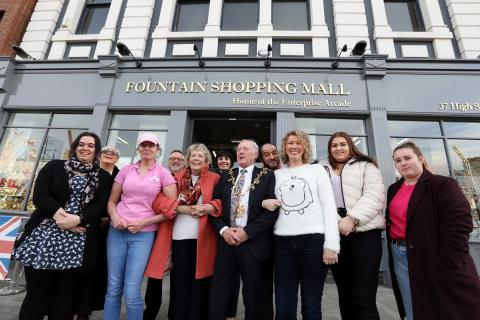A scheme implemented to help overcome the barriers to individuals starting up a retail business through the provision of low-cost, low-risk space alongside dedicated business support and advice with the ultimate aim of assessing a business’s viability before moving on to trade independently.
Powers used
- Powers of investment
- Civic leadership
The challenge
In 2011, Stockton-on-Tees Borough Council (SBC) began a £40 million investment programme aimed at improving the physical environment and function of Stockton High Street with a view to repositioning the role of Stockton town centre as the focal point for events, culture, specialist markets and independent retailers in the Tees Valley. A key strand of this ambition was the need to support the existing, strong independent retail sector to grow whilst looking to incentivise and attract new independent retailers to start up in the town centre.
Initial research suggested there were a number of individuals in the area with aspirations to start up in business but many lacked the know-how or means to undertake such a venture along with relatively low availability of suitably sized retail space at an affordable level for a first time business.
When undertaking research, it became clear that the main barrier for individuals looking to start up in retail was the availability of affordable space and favourable lease terms. Effectively, the level of risk was so high that many individuals were deterred from stepping into retailing without any certainty that they had a viable business idea.
The solution
Stockton-on-Tees Borough Council (SBC) has undertaken a £40 million investment programme to improve the physical environment of Stockton High Street and reposition the town centre with the Tees Valley as a focal point for events, culture and independent retailers.
A key strand of the investment programme was Stockton Enterprise Arcade (SEA). SBC sought to establish a facility that would take away some of this risk from the individual and to provide support to nurture growing businesses in the town centre. SBC negotiated the use, on a peppercorn rent, of a long-term vacant retail unit on the High Street and refitted the building to accommodate up to six start up businesses with roughly 9m2 trading space each under the banner of Stockton Enterprise Arcade (SEA).
SEA is an initiative, set up to encourage and support growth of independent retailers by providing the opportunity for individuals to test trade their retail business idea on the high street with a view to establishing a business’s viability and ultimately, where appropriate, move on to trade independently from their own premises.
SEA provides low rent retail space within a large shop unit on flexible terms for up to twelve months. Within that time, individuals receive specialist support and advice to help their business improve and grow.
SEA was initially established in 2011, demand for space steadily increased to the point where larger premises were needed, leading to the acquisition of a prominent, vacant building on the High Street in early 2014 with a view to undertaking a large scale refurbishment providing space for up to 16 businesses in the heart of the town centre.
The new facility was refurbished using a combination of council resource and £250,000 Heritage Lottery grant throughout summer 2014 and opened, fully occupied in November 2014.
The impact
Since opening in 2012, a total of 85 businesses have taken up space in either the original building the SEA occupied or the newly refurbished premises.
Further impact has been that the calibre and nature of start-up business setting up in the facility has also diversified and improved in terms of the value and quality of goods being sold and there is now a significant waiting list for businesses looking to take up space.
The SEA is now home to a bespoke leather goods repair and manufacturing business, which in the first two months of trading has received a number of high value orders for bespoke goods and repairs. This particular business, DW Saddlery & Leather was set up by a gentleman who had previously been injured in a manual job and had been unemployed for over ten years. The SEA and associated business support has provided the opportunity, which otherwise would have been incredibly difficult to access for a skilled craftsmen to establish a business, bring his goods and services to the high street and to move into employment and all of the financial and personal wellbeing benefits that this brings. The council are extremely confident that once this business has finished its six month tenure in the SEA, it will go on to be a success trading independently and adding to the retail offer in Stockton.
Lessons learned
The transition from the original SEA to the current building was not as smooth a process as had been hoped for. Delays in completing the refurbishment works meant that the lease on the original SEA expired eight weeks before the new building was ready. With the landlord unwilling to extend the lease, SBC had to find an interim solution that enabled five businesses to continue trading while work was finished.
To manage this transitional period, SBC negotiated a short-term lease in one of the town main shopping centres. This interim move required input form a number of council services, highlighting excellent cross-team working and commitment from individual officers, out of regular hours to ensure a smooth transition.
Successful temporary uses can evolve and grow, it is beneficial to be patient and take opportunities to respond to changing circumstances such as increased demand.

